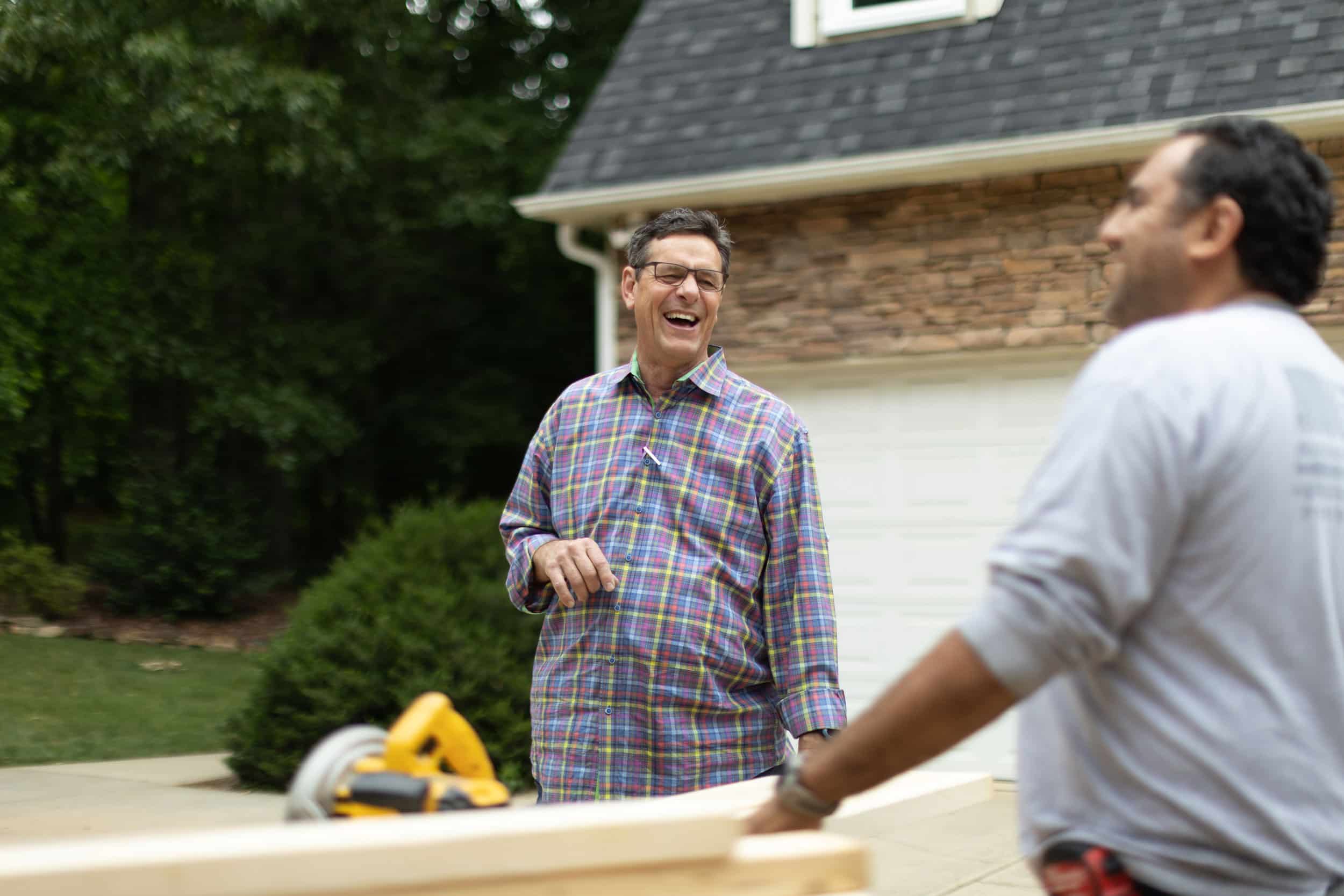Frequently Asked Questions
Remodeling and New Construction
Q: Should I remodel my existing home, pursue a smaller-scale renovation project, or would building a new home be a wiser choice?
A: Let’s discuss it. As professional remodeling contractors, renovation contractors, and experienced design/build professionals, we have the skills and resources to assist you in making a wise decision based on your family’s needs, the investment potential of remodeling or renovating vs. new home construction, and the resale value of your home.
Q: Will remodeling my home increase its resale value?
A: Quality of design and construction, type of project and the location of your home will be the major determining factors. Generally speaking, major kitchen remodeling and bath remodeling as well as well-planned and constructed additions, and smaller bathroom renovation and kitchen renovation projects provide a good return on your investment. Research has shown that poorly designed and constructed projects could reap disappointing results or offer no return on your investment.
Q: What is the difference between remodeling and renovating?
A: It’s primarily a question of scale. Remodeling projects typically require structural and/or footprint changes, as well as extensive changes to the layout of a room or the systems behind its walls. While no less dramatic, renovations are more limited in scope. A kitchen renovation, for example, may entail changing countertop surfaces, updating fixtures and refinishing cabinets. A kitchen remodel, in contrast, may necessitate the removal of walls, a change in the layout of cabinetry and appliances, and reworking the room’s electrical, gas and plumbing systems to accommodate those changes. Palmer Custom Builders is an experienced Remodeling and Renovation Contractor who can professionally handle your project – no matter what the size or scope.
Q: What is the time frame for completing a project like this?
A: Every project is unique. We’ll estimate the time frame once the scope of the project has been defined. An exact time frame is determined when all product selections have been made, and it will be spelled out in your Construction Agreement. Keeping a new home construction, remodeling or renovation project on schedule also requires a team effort between the homeowner and general contractor. The planning phase is crucial and may take longer than you expect. Avoiding the temptation to rush through this process will ultimately result in a more cost-effective and timely completed project. Throughout the process, it’s helpful for you to plan ahead, so you can be decisive as changes and questions arise. Our Construction Management Software helps us continually monitor the timeline and all the phases of your construction process so we can make necessary adjustments to ensure timely project completion.
Q: Can you assure us that you'll complete the project on schedule?
A: Doing all our homework up front in the planning process and determining the exact scope of the project is the first step in proper scheduling. Experience with planning ahead and knowing when to bring in each tradesman at the proper time is extremely important. We use project management tools to establish a definitive timeline. With our years of experience in scheduling, and a clear understanding of the process, we can ensure project completion on time or ahead of schedule. Timelines are typically only adjusted for unusual weather conditions or changes requested by the client.
Q: Will you build my custom home on the lot I own, or must I purchase a lot from you?
A: We are happy to build on your lot or to assist you in finding a suitable lot for the home you wish to build.
Q: Can we see photos of similar projects you have built?
A: Certainly. We have a portfolio of projects and client references that we are happy to share. Some of our completed projects are featured on this website as well.
Q: Have you constructed a project of this complexity?
A: Most likely, yes. We’re a diversified company with expertise in handling all types of projects ranging from small repairs and renovations, to complex remodeling projects, to the design and construction of multi-million-dollar homes.
Q: Will you design the room addition or do we need an architect?
A: Yes, as design-build professionals, we would design the room addition, and the design plan will be certified by a structural engineer, as required by the County Code Enforcement
Q: Could you recommend an interior designer?
A: Yes. We work with several talented interior designers and completely understand and appreciate the added value they bring to a project. We’re happy to make a recommendation for the best fit for you, or to work with an interior designer of your choice.
Q: Will you assist us in making material selections for our project?
A: Yes…we will assist you at every step of the way. We also have written a “Materials Selection Guide,” a helpful handbook that explains and familiarizes clients with the selection process.
Q: Do we have to move out of the house or can you work around us?
A: Together, we can determine what is needed to safely complete your project on a timely basis. In many cases, work can be completed while your family remains in the home. In projects where the roof and ceiling will be removed, power will be interrupted for some time, or in cases where there may be safety concerns, you will need to vacate your home for a period of time. In these cases, we pledge to work as quickly and efficiently as possible to minimize your absence.
Q: Will we need a permit for this project?
A: Most likely. We can advise you which permits are required and we’ll apply for all necessary permits on your behalf.
Q: Are you familiar with working with a Neighborhood Homeowners Associations' Architectural Control Committee or a Historic District Commission?
A: Yes, as an experienced remodeling contractor, design/build contractor and renovation contractor, we have experience working with these and other organizations in many different capacities. If you are a member of a neighborhood homeowner’s Association or are located in a historic district, you will be subject to certain Association Covenants and Restrictions and/or Historic District Standards and Policies. It is extremely important to review this information in the very early planning stages of any project. Most associations require the project’s design and materials to be pre-approved by their Architectural Control Committees. The association will provide guidelines to follow when submitting information. You, your designer and/or architect should know and understand the Historical District Guidelines before the planning and design process begins. The Historical District Commission must approve the project and issue a Certificate of Appropriateness before you can apply for a building permit.
Budgeting and Finance
Q: When we know exactly what the cost of the project will be, how do we establish a budget and how can cost overruns be prevented?
A: Completing a careful project review, determining the complexity and scope of the project, and defining product selections allows us to provide you with an exact job cost. Any subsequent change in the project cost would be a result of a client-requested change or due to discovering a concealed condition. As a rule of thumb, you should allow 10% to 15% of the estimated construction costs for unexpected expenses and changes you may want to make.
Q: Please explain the project payment process.
A: We want no surprises, so we will discuss this with you completely. The payment process is detailed in the final Construction Agreement. Project payments are established based on milestone completion phases of your project. We require a 30% – 35% Deposit at Construction Agreement, and progress payments at milestone completion (e.g., after completion of foundation, framing, mechanical rough-ins, sheetrock, tile, painting, etc.) and the balance is due upon substantial completion.
Business Practices
Q: Will the General Contractor be involved with my project on a daily basis?
A: Yes. Gary Palmer takes a “hands on” approach to project management, so he will be involved in your project daily. Additionally, with technological tools like iPhones, Smartphones, iPads, email, text, digital photography, faxes and computers, we all remain constantly in contact to ensure that we provide you with the best possible service and results.
Q: How long have you been in business?
A: Since 1986. For over 35 years we’ve been providing exceptional client service. We’ve honed our skills and our procedures to provide the highest quality results and the most efficient processes.
Q: Can you provide us with references?
A: We’d be happy to provide you with references! As a first step, you can review the Client Comments and Project Stories on this website. Additional references are always available upon request.
Q: Does your company carry workers' compensation and liability insurance?
A: We have a long-standing relationship with our insurance agent and are properly insured with general liability, and workers’ compensation. We are bonded as well, for your protection. All tradesman working for Palmer Custom Builders must also be fully covered with general liability and workers’ compensation insurance.
Q: Is Palmer Custom Builders properly licensed?
A: Palmer Custom Builders is a North Carolina Licensed General Contractor and holds a South Carolina Residential Builder’s license. We are committed to always being properly licensed and insured. Plumbers, electricians and heating and air conditioning contractors are required to be licensed by the states of North Carolina and South Carolina. Palmer Custom Builders employs only properly state-licensed and insured trade contractors.



